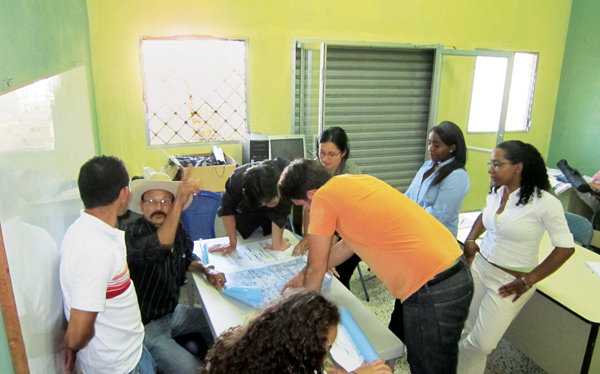
Clean water in Rio Hondo San Marcos Ocotepeque, Honduras is about as hard to come by as a sunny day in Binghamton.
But beginning last fall, five Binghamton University students took initiative to help change that by designing and building an entirely new water purification system for the community.
Erika Rollins, a senior majoring in industrial and systems engineering (ISE), was born and raised in Rio Hondo San Marcos Ocotepeque, an independently governed village with a population of about 200. To fulfill the ISE program’s senior project requirement, she decided to undertake a task that would hit close to home.
“I’m originally from there,” Rollins said. “The biggest problem there is the water. The system for how they get it is inefficient and not treated.” She explained that the town, which is autonomous from government any higher than within the city, has been plagued with dirty water and wasteful resource management since its establishment.
The other students most directly involved in the project are Roger Wan, a junior majoring in mechanical engineering, Adam Noel, Coralie Brutus and Meange Adeclat, all of whom are seniors majoring in ISE. The Society of Hispanic Professional Engineers (SHPE), which Rollins belongs to, has led fundraising efforts.
Wan estimated the project will cost $20,000 for all design and material aspects. He based the expected cost on proposals gathered among the senior project group, a small focus group from Rio Hondo San Marcos Ocotepeque, members of the Peace Corps, SHPE and AESMO, a Spanish acronym that translates to the Ecological Association of San Marcos. The Peace Corps and AESMO have helped ensure the purification system meets all legal standards and will eliminate existing water quality problems.
Rollins described the current main water source in the community as a giant tank that uses its mountainside elevation’s gravitational force to trickle water down to each home by straw-like pipes.
“When the water comes from the ground and a single pipe line, things get in the water,” she said. She explained that since every home’s line is connected, one break affects everyone farther down the line in the system.
Karen Salvage, associate professor and undergraduate program director for geological sciences and environmental studies, said any chemical in excess can pollute a groundwater system like Rio Hondo San Marcos Ocotepeque’s. She suspected that the village’s main source of income, its coffee crop, harmed water quality because of overfarming.
“In a less-developed area, having only one vegetation type would certainly affect soil development,” she said. She said low-quality soil does not adequately protect water from extra chemicals and hurts the water’s usability.
According to Salvage, a simple groundwater treatment system that Rio Hondo San Marcos Ocotepeque would need would include physical filtration for large floating particles and removal of small microbes by chlorination, ultraviolet light or boiling. She noted, however, that any chemical spill could contaminate the water.
Rollins said the two primary side effects of using the village’s tainted water have been E. coli and tapeworms. The water has been especially harmful to children, and she believes the purification system is an investment in the community’s future success.
“Most homes have five or six kids, so 70 percent of the population is kids. We’re looking into the future,” she said.
According to Wan, the majority of the design and planning phase is finished. In terms of implementation, his biggest fear is political: some other nations, including Italy and France, are looking to buy the land where the system is to be built. He said if that were to occur, the project group would have to buy the land back, resulting in skyrocketing and possibly prohibitive costs.
SHPE, Rollins and the senior project participants plan to travel to Rio Hondo San Marcos Ocotepeque in May to finalize labor for the system, which will be provided by the village’s government and volunteers who live there. BU students and Binghamton community members who wish to assist the project financially or otherwise can do so by e-mailing Rollins directly at erollin1@binghamton.edu or Robert Dextre, president of SHPE, at rdextre1@binghamton.edu.


